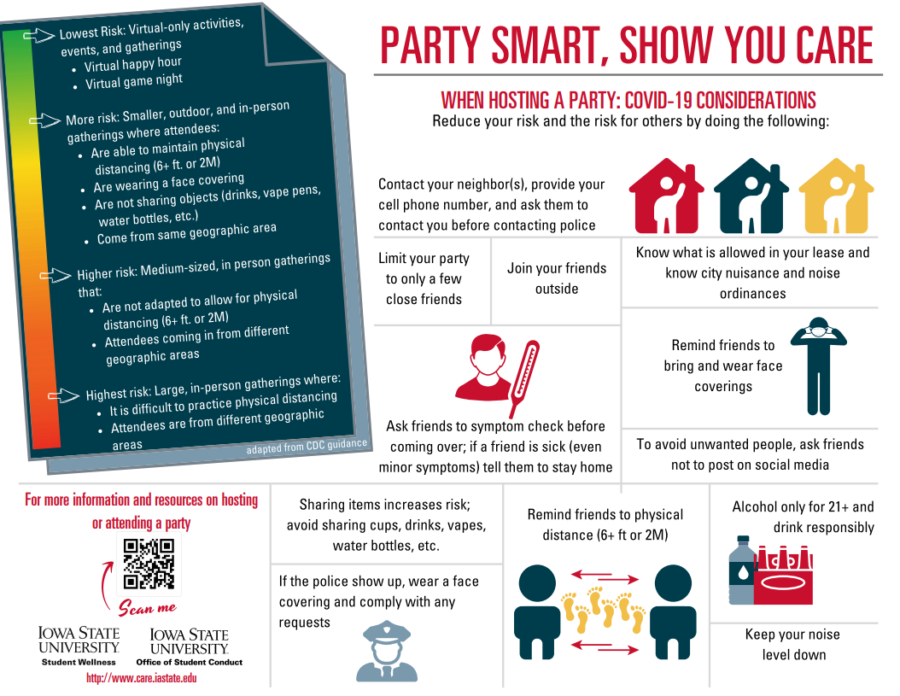Partying like a Cyclone
The Party Smart initiative infographic Iowa State President Wendy Wintersteen linked in her email acknowledging health risks posed by large parties such as “801 day.”
August 18, 2020
As students have returned to school and classes have begun, large parties have also started to occur around campus.
Last weekend, hundreds of students showed out to celebrate “801 day,” a designated day for students to celebrate the beginning of the school year. Students attended massive parties, most without face coverings.
Before the school year started, Iowa State Student Wellness introduced the “Party Smart” initiative to help encourage students to practice safe habits to reduce the spread of COVID-19. This initiative joins the “Party Like A Cyclone” initiative to promote safe partying habits among students.
This PDF posted on the Student Wellness website gives students tips on how to have fun while still protecting yourself and others.
A graphic that shows the range of lowest risk to highest risk activities is also included on the informational sheet.
The lowest risk category includes all virtual activities, events and gatherings such as virtual happy hour or virtual game night.
The next category is the more risk category, which includes smaller, outdoor and in-person gatherings where attendees are able to maintain physical distance, wear face coverings and don’t share items.
The higher risk category is made up of medium-sized events that do not allow for appropriate distancing and have attendees that come from different geographical areas.
Highest risk events are large, in-person gatherings that are crowded and have attendees coming from different areas.
If students do choose to host parties, Student Wellness also provides tips for how to be as safe as possible.
Brian Vanderheyden, director of Student Wellness, gave additional suggestions of activities students can do safely.
Some examples of activities that allow for proper social distancing include small group outdoor yard activities on Central Campus or outside houses, virtual trivia nights or wearing face coverings to attend the Ames Farmers’ Market. Recreation Services also has equipment available for rent such as kayaks and bikes.
An issue prevalent among young people is peer pressure. Vanderheyden also gave tips on how to encourage friends to practice safe and healthy habits.
Students should model the Cyclones Care behavior within their friend group, such as wearing a face covering, physically distancing, washing hands often and staying home if sick.
“Establish these behaviors as the social norms and expectations within your friend groups to help keep everyone safe,” Vanderheyden said. “Encourage friends to stay home if they are not feeling well. It’s hard to say no to hanging out with friends sometimes but it is the best way to mitigate the spread of COVID-19. Avoid peer pressuring others to hang out if they are not feeling well and support them staying home.”
Vanderheyden also said to check in on friends and help them connect with university resources such as Student Health and Wellness if they need support.
He also said to avoid large gatherings and stick to smaller group activities.
“Avoid large gatherings, particularly where you cannot maintain physical distance,” Vanderheyden said. “Rather, plan fun activities with smaller groups and choose fun activities where you can do the Cyclones Care behaviors.”
Information about recreational activities and equipment rental can be found on the Rec Services website. Other information about events happening around Ames can be found on the Ames Convention and Visitors Bureau website.







